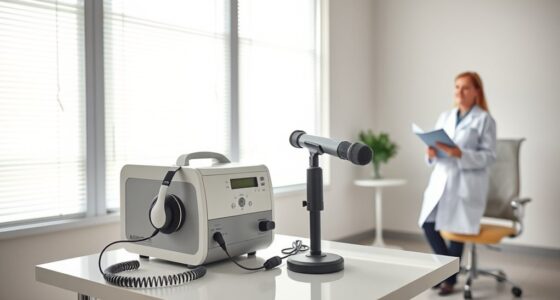Your VA priority group determines how quickly you can access audiology services and benefits based on your disability ratings and whether your hearing loss is service-connected. Higher ratings and proven links to your military service typically place you in a higher priority group, ensuring faster appointments and better coverage. Understanding your specific status helps you navigate the system more effectively. Keep going to discover more ways to maximize your VA benefits and care options.
Key Takeaways
- VA priority groups determine eligibility and access speed for audiology services based on disability severity and service connection.
- Higher disability ratings (50% or more) generally place veterans in higher priority groups for faster audiology care.
- Establishing a service connection for hearing issues can improve your disability rating and priority status.
- Proper VA enrollment and documentation are essential to ensure timely access to audiology evaluations and treatments.
- Knowing your priority group helps you understand your benefits, prepare necessary paperwork, and advocate effectively for care.

If you’re seeking audiology services through the VA, understanding your enrollment in the appropriate priority group is essential. Your priority group determines your eligibility for VA healthcare, including audiology evaluations and treatments. It’s based on various factors, primarily VA disability ratings and your service connection process. The VA uses these elements to categorize veterans, ensuring those with the greatest needs receive priority access to services. Knowing where you stand can help you better navigate the system and ensure timely care.
Your VA disability ratings play a key role in determining your priority group. These ratings, expressed as percentages, reflect the severity of your service-related conditions, including hearing loss or tinnitus. The higher your disability rating, the higher your priority group, which often means reduced or no copays and quicker access to services. For example, veterans with a 50% or higher disability rating usually fall into a higher priority category, guaranteeing more inclusive and prompt audiology care. Conversely, those with lower ratings may be in groups with more limited access or higher out-of-pocket costs.
The service connection process is central to establishing your eligibility for VA benefits, including audiology services. If your hearing issues are connected to your military service, you’ll need to demonstrate this connection through medical records, service documentation, or other evidence. Successfully establishing service connection can greatly impact your VA disability ratings, which in turn affect your priority group. If your hearing loss is linked to your service, it can lead to a higher disability rating, elevating your priority status, and making it easier for you to access the audiology services you need without unnecessary delays.
The VA’s enrollment process involves applying through the VA healthcare system, after which your information is reviewed to determine your eligibility and priority group. During this review, your VA disability ratings and service connection status are carefully considered. If you’re already rated highly for hearing-related conditions, you’re more likely to be placed in a priority group that guarantees quicker appointment scheduling. If your service connection or disability rating is uncertain or low, you might need to submit additional evidence to improve your standing.
Understanding where you fit in the VA priority groups helps you anticipate your access to audiology services and prepare necessary documentation. It also empowers you to advocate for yourself during the service connection process, ensuring your hearing issues and disabilities are properly recognized. Additionally, staying informed about industry trends can help you navigate changes in VA policies or eligibility criteria. Ultimately, knowing your priority group enables you to navigate the VA system more effectively, so you can receive the audiology care you deserve without unnecessary hurdles.
Frequently Asked Questions
How Often Can I Change My VA Audiology Enrollment Priority?
You can request priority changes and update your VA audiology enrollment as needed, but there’s no set limit on how often you can do so. It’s important to regularly review your eligibility and circumstances, then submit enrollment updates when your situation changes. Keep in mind that VA reviews your information periodically, and active updates help make sure you’re in the correct priority group, maximizing your access to audiology services.
Are There Wait Times for Audiology Services Within My Priority Group?
You might experience wait times or service delays for audiology services within your priority group, depending on your location and demand. While some veterans receive prompt care, others face longer waits due to limited staffing or high patient volume. To minimize delays, it’s helpful to schedule appointments early, stay in contact with your VA provider, and explore options like urgent care or telehealth if you’re facing significant wait times.
Can I Request a Reassignment to a Different Priority Group?
Thinking of changing your VA priority group is like trying to change the course of a river—you need to follow reassignment procedures carefully. You can request a reassignment, but it depends on eligibility criteria like current health status or service-connected disabilities. Contact your VA representative to understand the specific steps, as they’ll guide you through the process and let you know if your request is feasible based on your circumstances.
What Documentation Is Needed to Verify My Audiology Eligibility?
To verify your audiology eligibility, you need to provide documentation that confirms your service-connected hearing loss or related conditions. The documentation requirements typically include military service records, medical records, or VA disability ratings. You should gather relevant documents like your DD214, VA claim decisions, or doctor’s notes. This eligibility verification guarantees the VA can determine your priority group and provide you with appropriate audiology services.
How Does Enrollment Impact Access to Other VA Healthcare Services?
You might think that enrolling in VA audiology services only grants access to hearing care, but it actually opens doors to many healthcare benefits. By completing the enrollment process, you improve your service eligibility, which can lead to priority group placement. This placement often determines your access to additional VA healthcare services, ensuring you receive extensive care. So, enrolling not only helps with audiology needs but also enhances your overall VA healthcare experience.
Conclusion
Understanding VA priority group enrollment for audiology is like opening a door to better care. By knowing your group and the benefits it offers, you can access the audiology services you need without delay. Stay informed and proactive—think of it as your key to clear hearing and improved quality of life. Don’t wait on the sidelines; take charge of your health journey, just as you would steer a ship through calm and storm alike.











